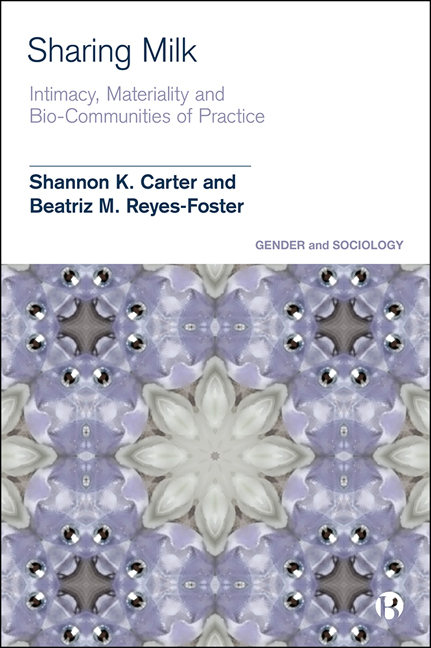Book contents
- Frontmatter
- Dedication
- Contents
- List of Figures and Tables
- Notes on the Authors
- Acknowledgements
- Preface
- 1 Introduction: Sharing Milk
- 2 Theorizing Milk Sharing
- 3 Entering Bio-Communities of Practice
- 4 Milk-Sharing Practices
- 5 The Milk-Sharing Network
- 6 Conclusion
- Notes
- Appendix A Survey Participant Demographics
- Appendix B Interview Participant Demographics
- References
- Index
6 - Conclusion
Published online by Cambridge University Press: 10 March 2021
- Frontmatter
- Dedication
- Contents
- List of Figures and Tables
- Notes on the Authors
- Acknowledgements
- Preface
- 1 Introduction: Sharing Milk
- 2 Theorizing Milk Sharing
- 3 Entering Bio-Communities of Practice
- 4 Milk-Sharing Practices
- 5 The Milk-Sharing Network
- 6 Conclusion
- Notes
- Appendix A Survey Participant Demographics
- Appendix B Interview Participant Demographics
- References
- Index
Summary
As we approached the final chapter of this book, two news headlines were circulating within the milk-sharing communities we studied. The first, an article in The Washington Post titled “Why These Bikers Crisscross New York Delivering Donated Breast Milk” (Free 2019), tells the heartwarming story of a motorcycle club that has partnered with an HMBANA milk bank in New York to deliver pasteurized breastmilk to homes and hospitals for babies who need it. The article emphasizes the altruism in both breastmilk donation and delivery by the motorcyclists, showing how two unlikely worlds – motorcycling and breastmilk feeding – come together for a greater purpose. The milk is referred to as ‘precious cargo’, and its health benefits to the receiving babies are presented as scientifically indisputable. The article emphasizes the social relationships that emerge from the partnership, where the motorcyclists connect with the founder of the milk bank as well as the parents and babies to whom they bring milk. These community connections, along with the greater purpose of delivering human milk to needy babies, is described as ‘wonderful’, ‘rewarding’ and ‘inspired by kindness’.
The second headline derives from a news article from Physician's Weekly titled “AAP: Most Moms Unconcerned with Informal Milk Sharing” (HealthDay News 2019). The article reports a new study presented at the American Academy of Pediatrics annual meeting that used survey data to assess concerns related to breastmilk obtained through ‘informal milk sharing’ rather than through milk banks. The article reports that a high percentage of participants who used peershared milk were not concerned about the quality of the milk, and most did not screen donors because they trusted them. These findings are presented as problematic, and cause for serious concern. The article characterizes peer milk in terms of risk, stating that peer milk sharing is ‘discouraged by the pediatric medical community’. It concludes with a quote from one of the researchers, stating that it is ‘crucial that physicians become aware of this practice and the associated risks so that they can educate patients and address this growing concern’.
These articles reflect an ongoing cultural narrative that presents the use of banked breastmilk as safe, medically supported, and contributing to a greater moral good, and the use of peer breastmilk as risky, medically discouraged, and an emergent social problem.
- Type
- Chapter
- Information
- Sharing MilkIntimacy, Materiality and Bio-Communities of Practice, pp. 165 - 174Publisher: Bristol University PressPrint publication year: 2020



